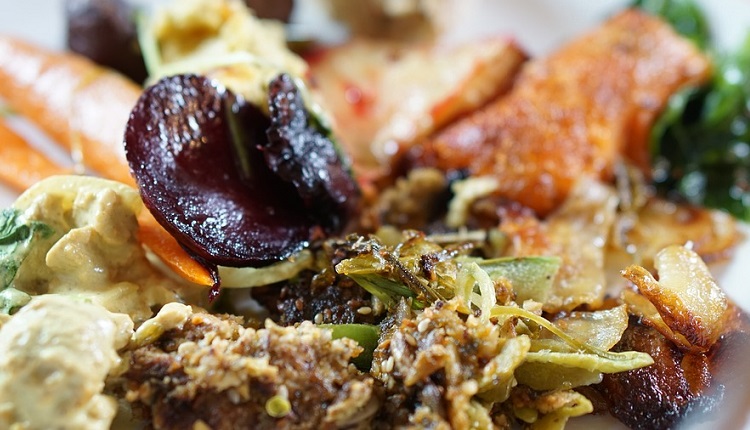A Former Meat Lover’s Guide to a Painless Transition to Vegetarianism
Have you stumbled yet upon this fantastic article written by our very own Shaun O’Connor detailing the benefits of vegetarianism? If you haven’t, I strongly suggest you give it a read. This article is actually the thing that prompted me to really start researching the environmental and health problems that result from society’s overconsumption of meat. I wish I had cared enough to learn sooner, but today, I live a vegetarian lifestyle.
Our addiction to a carnivorous lifestyle has taken quite the toll on our planet, and that’s before we consider the suffering innocent animals endure on factory farms. Still, switching to vegetarian eating does require learning new dining habits and making certain to get enough vital nutrients, particularly protein. Here’s how I successfully made the switch to vegetarian eating, and how you can, too.
Take It One Week (Or Day) at a Time
Those familiar with twelve-step programs know that vowing to swear off anything for a lifetime easily overwhelms even those who normally possess the willpower of a superhero. The word “never” can scare even those with the best reasons to go vegetarian.
Instead of looking at going vegetarian as an all-or-nothing proposition, focus instead on going meat free one day, even one meal, at a time. View each meat-free meal as a choice, not a punishment. You’re making a responsible decision to reduce your carbon footprint and to decrease animal suffering.
Accept that slip-ups and exceptions may occur and treat yourself gently when they do. If you must eat meat, do your research and try to buy organic meats raised on local farms where animals are treated humanely. Even though consuming meat contributes to excessive methane production which damages the ozone level, at least you’ll rest assured that the animal who died for your meal lived a good life first.
Get Enough Non-Meat Protein
The biggest nutritional challenge new vegetarians face is how to consume sufficient protein to fuel their bodies’ needs. Meat offers a complete protein source, meaning it contains all the amino acids necessary for proper bodily function. Vegetarians need to consume a wide variety of plant-based protein to ensure they derive all the amino acids requisite for optimum health.
Many whole grains pack a protein punch, so skip the Wonder bread and the refined pastas. Opt instead for breads made from rye, oat or amaranth and pastas made from whole wheat.
Nuts and seeds also offer high levels of protein coupled with essential fatty acids needed for brain functioning. Nosh on almonds or pumpkin seeds at snack time and top salads with chia or sunflower seeds. If baking, seek out flours that incorporate finely ground nuts into the dough mix to create delectable, high-protein muffins and cookies.
There’s a reason why many ethnic dishes revolve around beans. Beans and legumes such as kidney and black beans contain a ton of protein without all the saturated fat or calories found in beef or pork. Plus, who doesn’t enjoy three-bean salads now and then?
Explore Vegetarian Recipes
Beginning a vegetarian or mostly vegetarian lifestyle goes much more smoothly when the recipes you whip up please your palate. Learning how to craft new vegetarian recipes and adding your own unique twists to them eases the transition to meat-free living.
Many vegetarians use quinoa as a dietary staple as it’s loaded with protein and other nutrients. Proper preparation of a family-sized portion of quinoa takes only about 30 minutes. Once cooked, though, you can add quinoa to soups to create a more stick-to-your-ribs bowl, serve it as a base for a vegetable stir fry or even sprinkle some over salads to up your protein quotient for the day.
Educate yourself as to what foods make excellent vegetarian substitutions for meat. Tofu and tempeh make for terrific meat substitutes. Those restricting gluten can even find vegan meat substitutes made from mushrooms and other gluten-free ingredients.

Remind Yourself of the Health Benefits
Even the best laid plans for converting to vegetarian eating can go awry. When you find your commitment to vegetarian eating wavering, remind yourself of the health benefits your body reaps when you make smart food choices.
Those switching to vegetarian eating often lose weight due to the fact that plant-based proteins contain far less fat than their animal counterparts. If you have a few extra pounds to spare, remind yourself of the benefits restricting meat consumption can have.
Additionally, plant-based diets benefit even elite marathon runners and other athletes. Meat-based proteins take an enormous amount of energy to digest, leaving you feeling tired and sluggish. Plant-based foods provide a much more readily available source of glycogen necessary for energy production.
Renew Your Connection with the Earth
Finally, when What-A-Burger starts singing you a siren song, remind yourself of the ecological benefits of switching to a vegetarian lifestyle. Meat production uses a ton of water and land. Clearing land for cattle continues to decimate the earth’s rainforests. Agricultural runoff often renders nearby water sources unsafe for human consumption.
Factory farms cause livestock animals untold suffering each day. Pigs used as breeder sows get crammed into cages so tiny that they cannot stand up or turn around. Nearly all female livestock endure repeated forced insemination, causing them to procreate far more than nature ever intended.
Consumption of meat even contributes to world hunger. Cattle consume more than 80 percent of the world’s grain production, grains that could otherwise be used to feed starving children and their families.
Here’s to a Plant-Based Lifestyle
Switching to vegetarian eating intimidates many at first, but any and all efforts to minimize our carnivorous consumption ultimately benefit both our health and the health of the planet. Even if you cannot commit to going meat free for life, simply researching where your meat comes from and cutting down on the amount of meat you eat brings substantial benefits. Here’s to a happy, healthy, sustainable and kind lifestyle!
